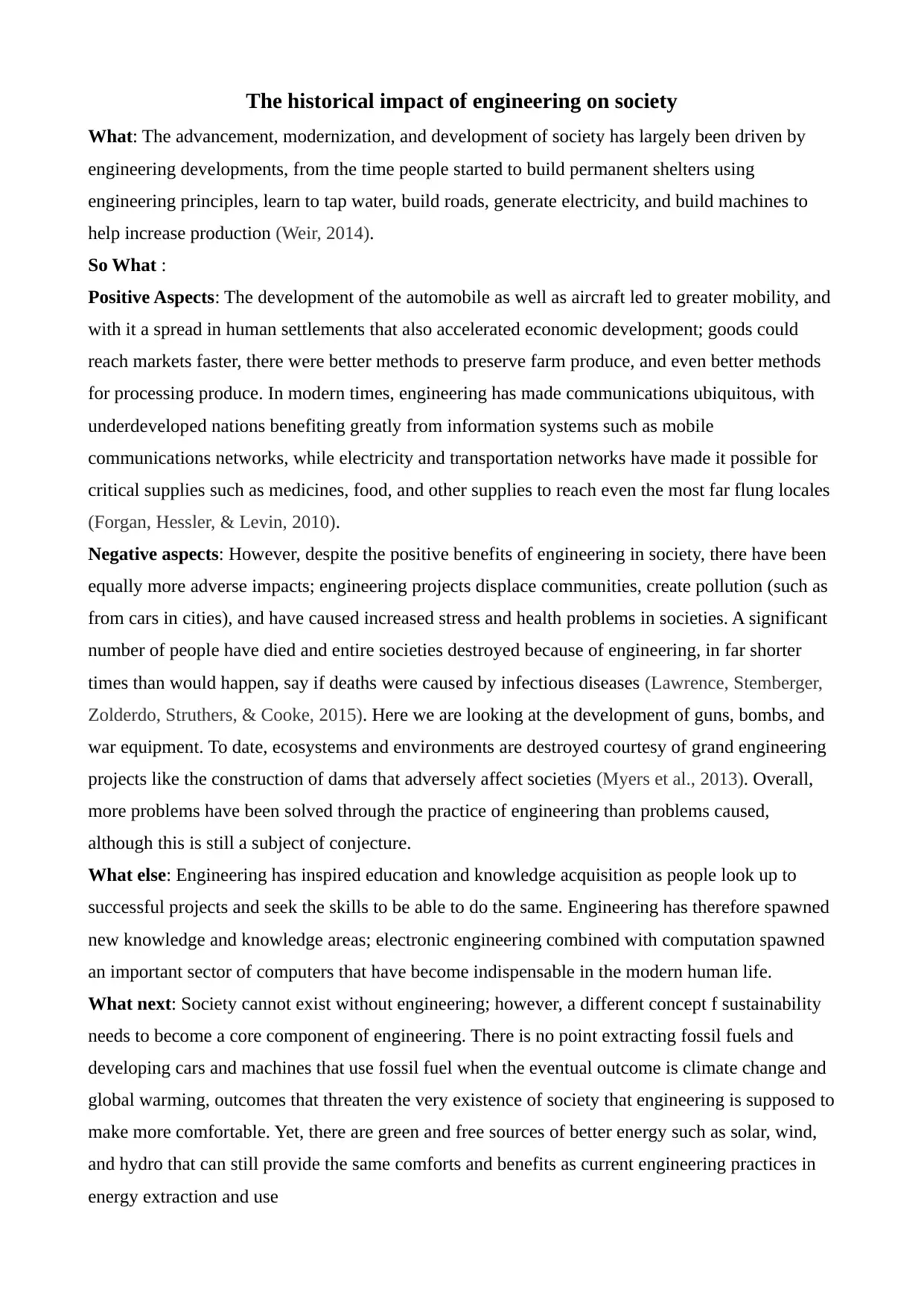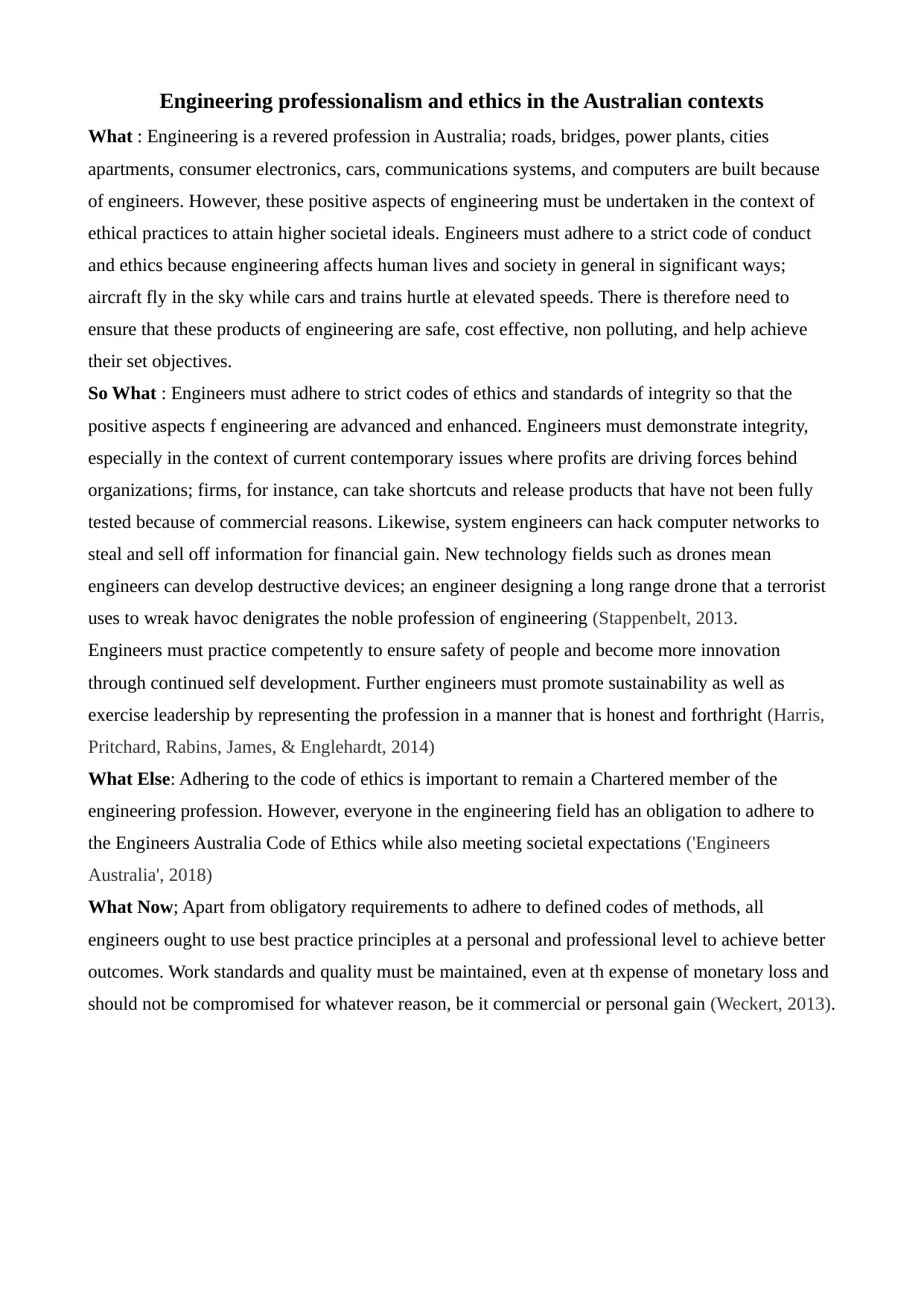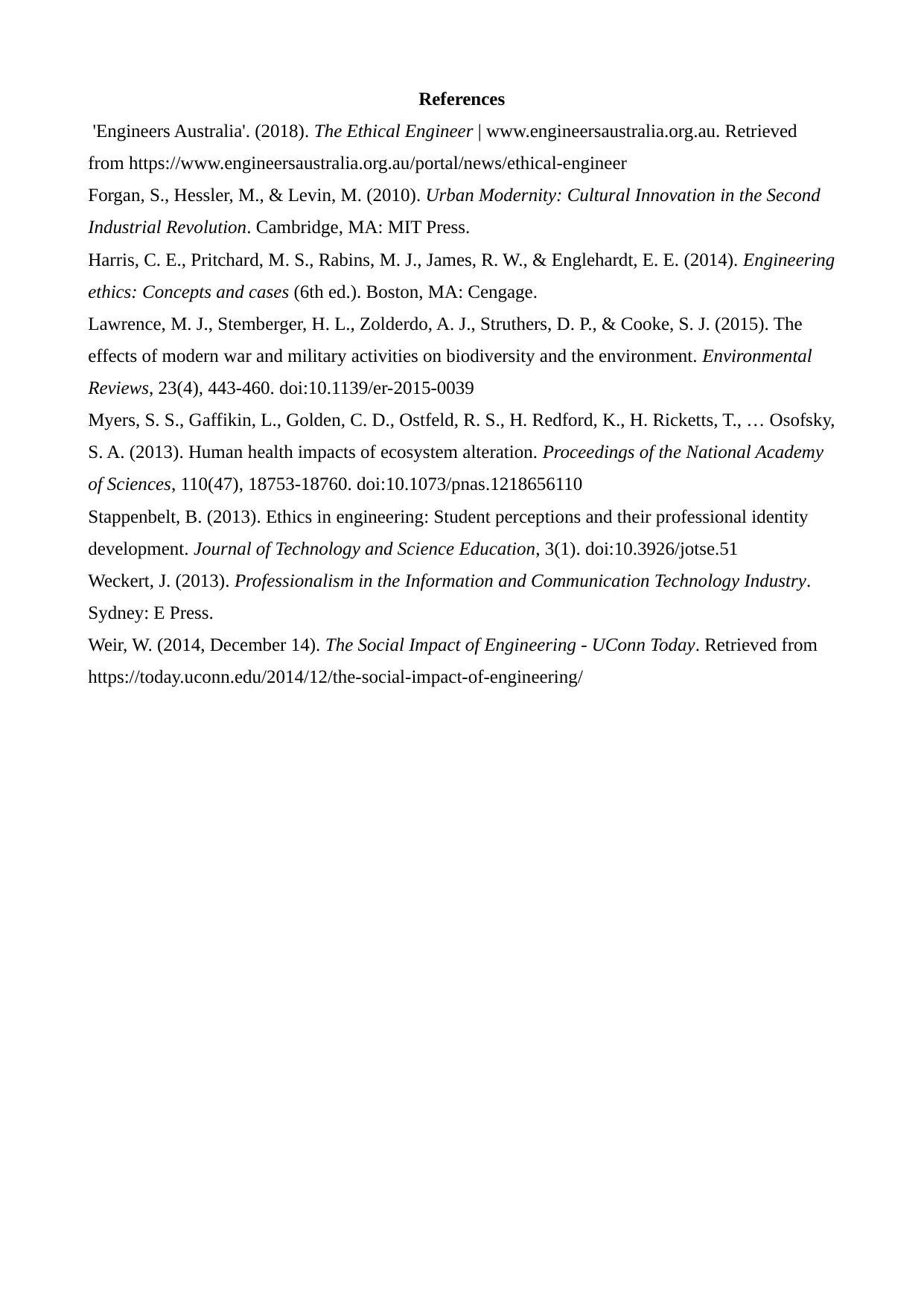ENEG20001: Engineering Practice Reflective Essay on Impact & Ethics
VerifiedAdded on 2023/06/12
|4
|1249
|289
Essay
AI Summary
This essay examines the historical impact of engineering on society, highlighting both positive advancements like increased mobility and communication, and negative consequences such as pollution and displacement. It emphasizes the importance of sustainability in future engineering practices. Furthermore, the essay discusses engineering professionalism and ethics within the Australian context, stressing the necessity for engineers to adhere to strict codes of conduct and integrity. It covers the need for engineers to practice competently, promote sustainability, and exercise leadership, referencing the Engineers Australia Code of Ethics. The essay concludes by advocating for best practice principles at both personal and professional levels, ensuring work standards and quality are maintained, even at the expense of monetary gain.

AUSTRALIAN ENGINEERING PRACTICE
NAME
DATE
NAME
DATE
Paraphrase This Document
Need a fresh take? Get an instant paraphrase of this document with our AI Paraphraser

The historical impact of engineering on society
What: The advancement, modernization, and development of society has largely been driven by
engineering developments, from the time people started to build permanent shelters using
engineering principles, learn to tap water, build roads, generate electricity, and build machines to
help increase production (Weir, 2014).
So What :
Positive Aspects: The development of the automobile as well as aircraft led to greater mobility, and
with it a spread in human settlements that also accelerated economic development; goods could
reach markets faster, there were better methods to preserve farm produce, and even better methods
for processing produce. In modern times, engineering has made communications ubiquitous, with
underdeveloped nations benefiting greatly from information systems such as mobile
communications networks, while electricity and transportation networks have made it possible for
critical supplies such as medicines, food, and other supplies to reach even the most far flung locales
(Forgan, Hessler, & Levin, 2010).
Negative aspects: However, despite the positive benefits of engineering in society, there have been
equally more adverse impacts; engineering projects displace communities, create pollution (such as
from cars in cities), and have caused increased stress and health problems in societies. A significant
number of people have died and entire societies destroyed because of engineering, in far shorter
times than would happen, say if deaths were caused by infectious diseases (Lawrence, Stemberger,
Zolderdo, Struthers, & Cooke, 2015). Here we are looking at the development of guns, bombs, and
war equipment. To date, ecosystems and environments are destroyed courtesy of grand engineering
projects like the construction of dams that adversely affect societies (Myers et al., 2013). Overall,
more problems have been solved through the practice of engineering than problems caused,
although this is still a subject of conjecture.
What else: Engineering has inspired education and knowledge acquisition as people look up to
successful projects and seek the skills to be able to do the same. Engineering has therefore spawned
new knowledge and knowledge areas; electronic engineering combined with computation spawned
an important sector of computers that have become indispensable in the modern human life.
What next: Society cannot exist without engineering; however, a different concept f sustainability
needs to become a core component of engineering. There is no point extracting fossil fuels and
developing cars and machines that use fossil fuel when the eventual outcome is climate change and
global warming, outcomes that threaten the very existence of society that engineering is supposed to
make more comfortable. Yet, there are green and free sources of better energy such as solar, wind,
and hydro that can still provide the same comforts and benefits as current engineering practices in
energy extraction and use
What: The advancement, modernization, and development of society has largely been driven by
engineering developments, from the time people started to build permanent shelters using
engineering principles, learn to tap water, build roads, generate electricity, and build machines to
help increase production (Weir, 2014).
So What :
Positive Aspects: The development of the automobile as well as aircraft led to greater mobility, and
with it a spread in human settlements that also accelerated economic development; goods could
reach markets faster, there were better methods to preserve farm produce, and even better methods
for processing produce. In modern times, engineering has made communications ubiquitous, with
underdeveloped nations benefiting greatly from information systems such as mobile
communications networks, while electricity and transportation networks have made it possible for
critical supplies such as medicines, food, and other supplies to reach even the most far flung locales
(Forgan, Hessler, & Levin, 2010).
Negative aspects: However, despite the positive benefits of engineering in society, there have been
equally more adverse impacts; engineering projects displace communities, create pollution (such as
from cars in cities), and have caused increased stress and health problems in societies. A significant
number of people have died and entire societies destroyed because of engineering, in far shorter
times than would happen, say if deaths were caused by infectious diseases (Lawrence, Stemberger,
Zolderdo, Struthers, & Cooke, 2015). Here we are looking at the development of guns, bombs, and
war equipment. To date, ecosystems and environments are destroyed courtesy of grand engineering
projects like the construction of dams that adversely affect societies (Myers et al., 2013). Overall,
more problems have been solved through the practice of engineering than problems caused,
although this is still a subject of conjecture.
What else: Engineering has inspired education and knowledge acquisition as people look up to
successful projects and seek the skills to be able to do the same. Engineering has therefore spawned
new knowledge and knowledge areas; electronic engineering combined with computation spawned
an important sector of computers that have become indispensable in the modern human life.
What next: Society cannot exist without engineering; however, a different concept f sustainability
needs to become a core component of engineering. There is no point extracting fossil fuels and
developing cars and machines that use fossil fuel when the eventual outcome is climate change and
global warming, outcomes that threaten the very existence of society that engineering is supposed to
make more comfortable. Yet, there are green and free sources of better energy such as solar, wind,
and hydro that can still provide the same comforts and benefits as current engineering practices in
energy extraction and use

Engineering professionalism and ethics in the Australian contexts
What : Engineering is a revered profession in Australia; roads, bridges, power plants, cities
apartments, consumer electronics, cars, communications systems, and computers are built because
of engineers. However, these positive aspects of engineering must be undertaken in the context of
ethical practices to attain higher societal ideals. Engineers must adhere to a strict code of conduct
and ethics because engineering affects human lives and society in general in significant ways;
aircraft fly in the sky while cars and trains hurtle at elevated speeds. There is therefore need to
ensure that these products of engineering are safe, cost effective, non polluting, and help achieve
their set objectives.
So What : Engineers must adhere to strict codes of ethics and standards of integrity so that the
positive aspects f engineering are advanced and enhanced. Engineers must demonstrate integrity,
especially in the context of current contemporary issues where profits are driving forces behind
organizations; firms, for instance, can take shortcuts and release products that have not been fully
tested because of commercial reasons. Likewise, system engineers can hack computer networks to
steal and sell off information for financial gain. New technology fields such as drones mean
engineers can develop destructive devices; an engineer designing a long range drone that a terrorist
uses to wreak havoc denigrates the noble profession of engineering (Stappenbelt, 2013.
Engineers must practice competently to ensure safety of people and become more innovation
through continued self development. Further engineers must promote sustainability as well as
exercise leadership by representing the profession in a manner that is honest and forthright (Harris,
Pritchard, Rabins, James, & Englehardt, 2014)
What Else: Adhering to the code of ethics is important to remain a Chartered member of the
engineering profession. However, everyone in the engineering field has an obligation to adhere to
the Engineers Australia Code of Ethics while also meeting societal expectations ('Engineers
Australia', 2018)
What Now; Apart from obligatory requirements to adhere to defined codes of methods, all
engineers ought to use best practice principles at a personal and professional level to achieve better
outcomes. Work standards and quality must be maintained, even at th expense of monetary loss and
should not be compromised for whatever reason, be it commercial or personal gain (Weckert, 2013).
What : Engineering is a revered profession in Australia; roads, bridges, power plants, cities
apartments, consumer electronics, cars, communications systems, and computers are built because
of engineers. However, these positive aspects of engineering must be undertaken in the context of
ethical practices to attain higher societal ideals. Engineers must adhere to a strict code of conduct
and ethics because engineering affects human lives and society in general in significant ways;
aircraft fly in the sky while cars and trains hurtle at elevated speeds. There is therefore need to
ensure that these products of engineering are safe, cost effective, non polluting, and help achieve
their set objectives.
So What : Engineers must adhere to strict codes of ethics and standards of integrity so that the
positive aspects f engineering are advanced and enhanced. Engineers must demonstrate integrity,
especially in the context of current contemporary issues where profits are driving forces behind
organizations; firms, for instance, can take shortcuts and release products that have not been fully
tested because of commercial reasons. Likewise, system engineers can hack computer networks to
steal and sell off information for financial gain. New technology fields such as drones mean
engineers can develop destructive devices; an engineer designing a long range drone that a terrorist
uses to wreak havoc denigrates the noble profession of engineering (Stappenbelt, 2013.
Engineers must practice competently to ensure safety of people and become more innovation
through continued self development. Further engineers must promote sustainability as well as
exercise leadership by representing the profession in a manner that is honest and forthright (Harris,
Pritchard, Rabins, James, & Englehardt, 2014)
What Else: Adhering to the code of ethics is important to remain a Chartered member of the
engineering profession. However, everyone in the engineering field has an obligation to adhere to
the Engineers Australia Code of Ethics while also meeting societal expectations ('Engineers
Australia', 2018)
What Now; Apart from obligatory requirements to adhere to defined codes of methods, all
engineers ought to use best practice principles at a personal and professional level to achieve better
outcomes. Work standards and quality must be maintained, even at th expense of monetary loss and
should not be compromised for whatever reason, be it commercial or personal gain (Weckert, 2013).
⊘ This is a preview!⊘
Do you want full access?
Subscribe today to unlock all pages.

Trusted by 1+ million students worldwide

References
'Engineers Australia'. (2018). The Ethical Engineer | www.engineersaustralia.org.au. Retrieved
from https://www.engineersaustralia.org.au/portal/news/ethical-engineer
Forgan, S., Hessler, M., & Levin, M. (2010). Urban Modernity: Cultural Innovation in the Second
Industrial Revolution. Cambridge, MA: MIT Press.
Harris, C. E., Pritchard, M. S., Rabins, M. J., James, R. W., & Englehardt, E. E. (2014). Engineering
ethics: Concepts and cases (6th ed.). Boston, MA: Cengage.
Lawrence, M. J., Stemberger, H. L., Zolderdo, A. J., Struthers, D. P., & Cooke, S. J. (2015). The
effects of modern war and military activities on biodiversity and the environment. Environmental
Reviews, 23(4), 443-460. doi:10.1139/er-2015-0039
Myers, S. S., Gaffikin, L., Golden, C. D., Ostfeld, R. S., H. Redford, K., H. Ricketts, T., … Osofsky,
S. A. (2013). Human health impacts of ecosystem alteration. Proceedings of the National Academy
of Sciences, 110(47), 18753-18760. doi:10.1073/pnas.1218656110
Stappenbelt, B. (2013). Ethics in engineering: Student perceptions and their professional identity
development. Journal of Technology and Science Education, 3(1). doi:10.3926/jotse.51
Weckert, J. (2013). Professionalism in the Information and Communication Technology Industry.
Sydney: E Press.
Weir, W. (2014, December 14). The Social Impact of Engineering - UConn Today. Retrieved from
https://today.uconn.edu/2014/12/the-social-impact-of-engineering/
'Engineers Australia'. (2018). The Ethical Engineer | www.engineersaustralia.org.au. Retrieved
from https://www.engineersaustralia.org.au/portal/news/ethical-engineer
Forgan, S., Hessler, M., & Levin, M. (2010). Urban Modernity: Cultural Innovation in the Second
Industrial Revolution. Cambridge, MA: MIT Press.
Harris, C. E., Pritchard, M. S., Rabins, M. J., James, R. W., & Englehardt, E. E. (2014). Engineering
ethics: Concepts and cases (6th ed.). Boston, MA: Cengage.
Lawrence, M. J., Stemberger, H. L., Zolderdo, A. J., Struthers, D. P., & Cooke, S. J. (2015). The
effects of modern war and military activities on biodiversity and the environment. Environmental
Reviews, 23(4), 443-460. doi:10.1139/er-2015-0039
Myers, S. S., Gaffikin, L., Golden, C. D., Ostfeld, R. S., H. Redford, K., H. Ricketts, T., … Osofsky,
S. A. (2013). Human health impacts of ecosystem alteration. Proceedings of the National Academy
of Sciences, 110(47), 18753-18760. doi:10.1073/pnas.1218656110
Stappenbelt, B. (2013). Ethics in engineering: Student perceptions and their professional identity
development. Journal of Technology and Science Education, 3(1). doi:10.3926/jotse.51
Weckert, J. (2013). Professionalism in the Information and Communication Technology Industry.
Sydney: E Press.
Weir, W. (2014, December 14). The Social Impact of Engineering - UConn Today. Retrieved from
https://today.uconn.edu/2014/12/the-social-impact-of-engineering/
1 out of 4
Related Documents
Your All-in-One AI-Powered Toolkit for Academic Success.
+13062052269
info@desklib.com
Available 24*7 on WhatsApp / Email
![[object Object]](/_next/static/media/star-bottom.7253800d.svg)
Unlock your academic potential
Copyright © 2020–2026 A2Z Services. All Rights Reserved. Developed and managed by ZUCOL.





